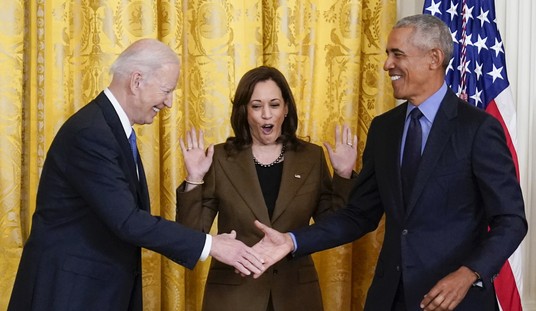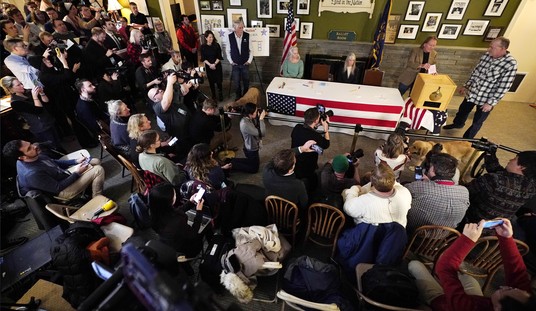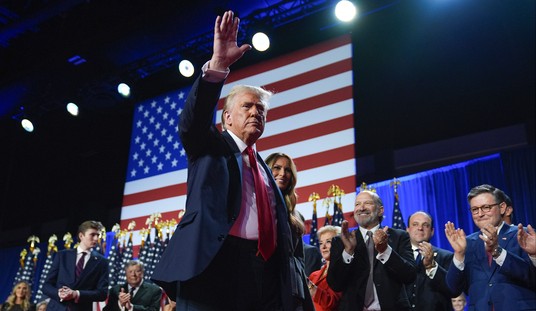Today’s state party attack ad is tomorrow’s Tim Pawlenty closing argument, my friends. His chief defense of RomneyCare on the trail will presumably be the federalist argument, that the D.C. leviathan should keep its, er, mitts off of health care but that the states are free to innovate to maximize citizens’ well-being. A reply that’s already popping up from rival campaigns: What sort of innovation, specifically, does he have in mind?
He notes in the book, “My own preference is to let each state fashion its own program to meet the distinct needs of its citizens. States could follow the Massachusetts model if they choose, or they could develop plans of their own.” Two pages earlier he writes that he was able to obtain federal cooperation because his experiment could be a model for other states, but four pages later, he notes that from the beginning he warned that what worked in the Bay State might not work in California or Texas.
And so it is that Romney’s opponents accuse him of wanting to have it both ways. His critics’ question is: Precisely what does he think is good about the reform law he signed, and what wouldn’t he want for other states?
“He obviously was very involved in the process and knows a lot about it, and that’s why his vagueness is so galling,” said an adviser to one of Romney’s rivals for the nomination. “Which parts does he like for which states?”
South Carolina political consultant Richard Quinn, who would advise Jon Huntsman’s presidential effort, put it this way: “Governor Romney keeps saying his health care program has some good parts that can be a model for other states. Which parts of government-run health care does he like? The unconstitutional mandates? Bringing an end to competition in health care? Higher taxes? Massive new government spending? I don’t think South Carolina wants any part of that.”
His answer will be that he wants all citizens covered in order to spare taxpayers the cost of ER care for free riders, but that’ll lead straight into a killer discussion of the mandate. Philip Klein, who’s celebrating today’s anniversary with a list of the five failed defenses of RomneyCare, is ready for the federalism excuse:
Though the Massachusetts plan was a state-based approach, as Cato’s Michael Cannon has pointed out, the federal government finances 20 percent of the plan through Medicaid.
Putting this aside, there’s no doubt that states should have flexibility over their own health care systems and that a state mandate does not raise the same constitutional questions as a federal one. Yet when governors run for office, we evaluate them based on the policies they enacted as state executives. If states are laboratories of democracy, governors should be judged by the experiments that they initiate. If Romney passed ambitious state tax or education reforms, he’d be running ads touting them. Similarly, he’ll no doubt be criticizing his primary opponents for their own governing records. If Romney were to get away with the federalism dodge in this instance, it would render the process of vetting presidential candidates who served as governors virtually meaningless, because they could respond to any unpopular aspect of their records simply by disavowing the same policies at the national level.
Klein’s conclusion, which seems increasingly plausible, is that Romney wins only if there’s no alternative viable candidate and/or some new issue pops up to command primary voters’ attention, leaving ObamaCare a secondary concern. Pawlenty and Barbour are both viable, though — assuming that one of them wins Iowa — and, barring a double-dip recession, it’s hard to imagine a new policy matter springing up that would potentially favor Romney over his rivals. His best shot, I think (assuming Huckabee doesn’t run), is for Barbour to win Iowa, at which point Mitt would argue that a governor from the deep south is uniquely poorly positioned to defeat the first black president. Electability, in other words. I don’t know how he makes an electability argument against Pawlenty, though, if T-Paw emerges from Iowa. He’d be tough to stop in a two-man race, precisely because of what you’re about to see.
Exit question: Did Mitt really tell a bunch of fundraisers today that he doesn’t know if America’s willing to tackle entitlement reform? I sympathize with his skepticism, and I know he was more aggressive about the topic in his book, but that’s hideously poor messaging the day before the big Obama/Ryan boxing match is set to begin in earnest.









Join the conversation as a VIP Member